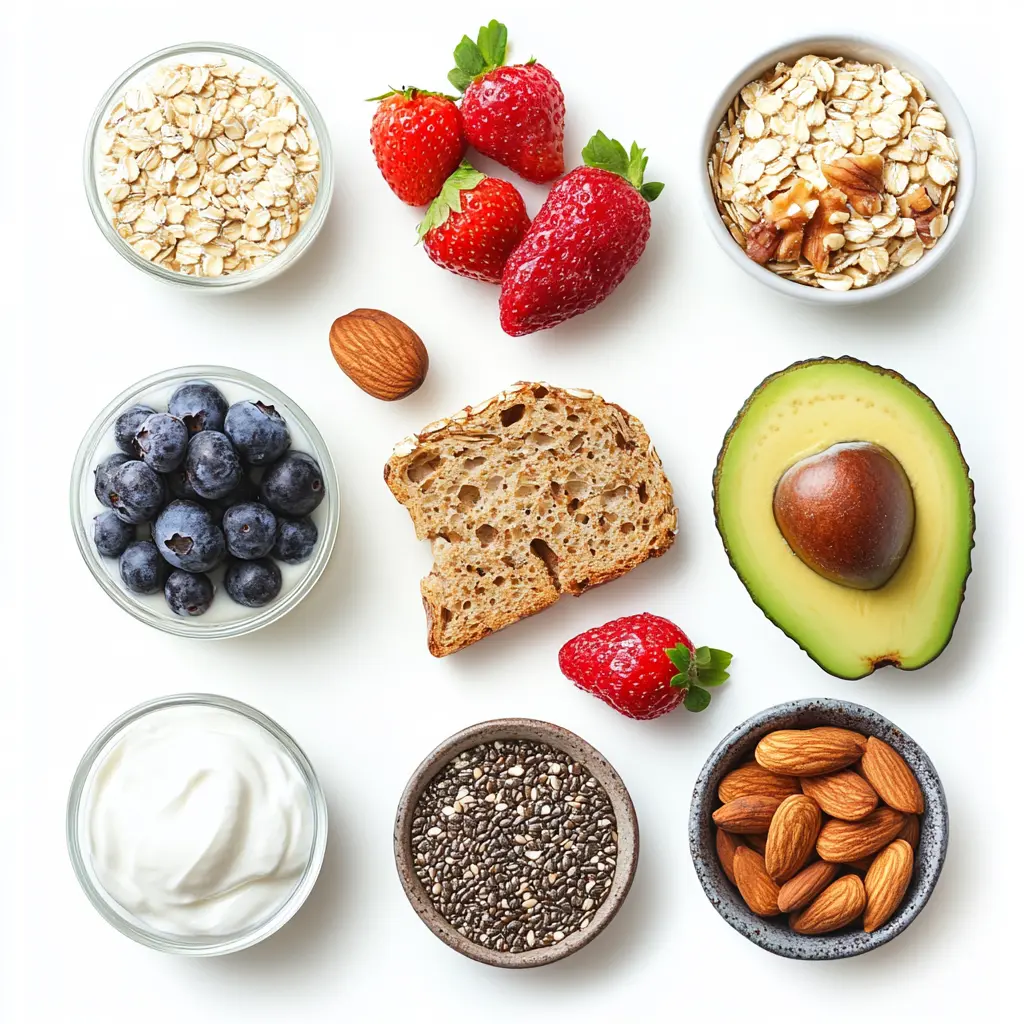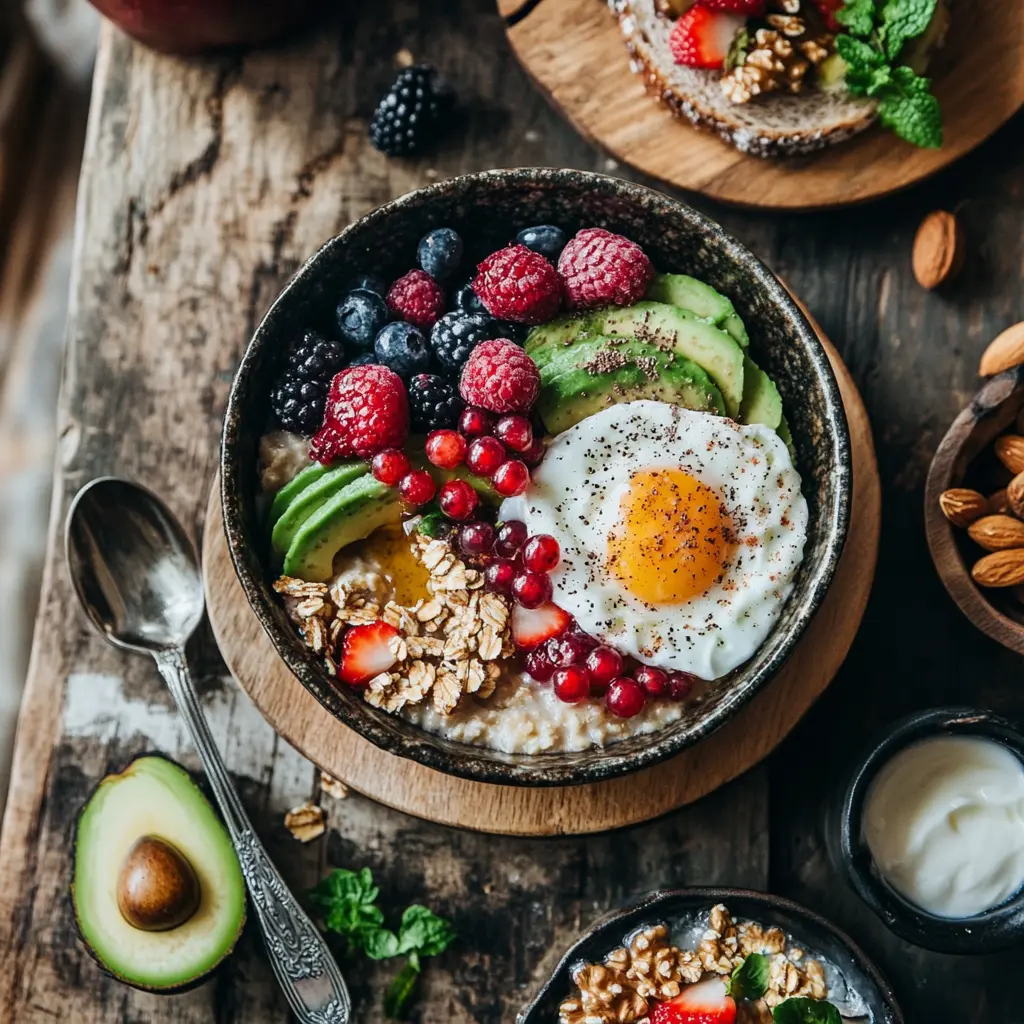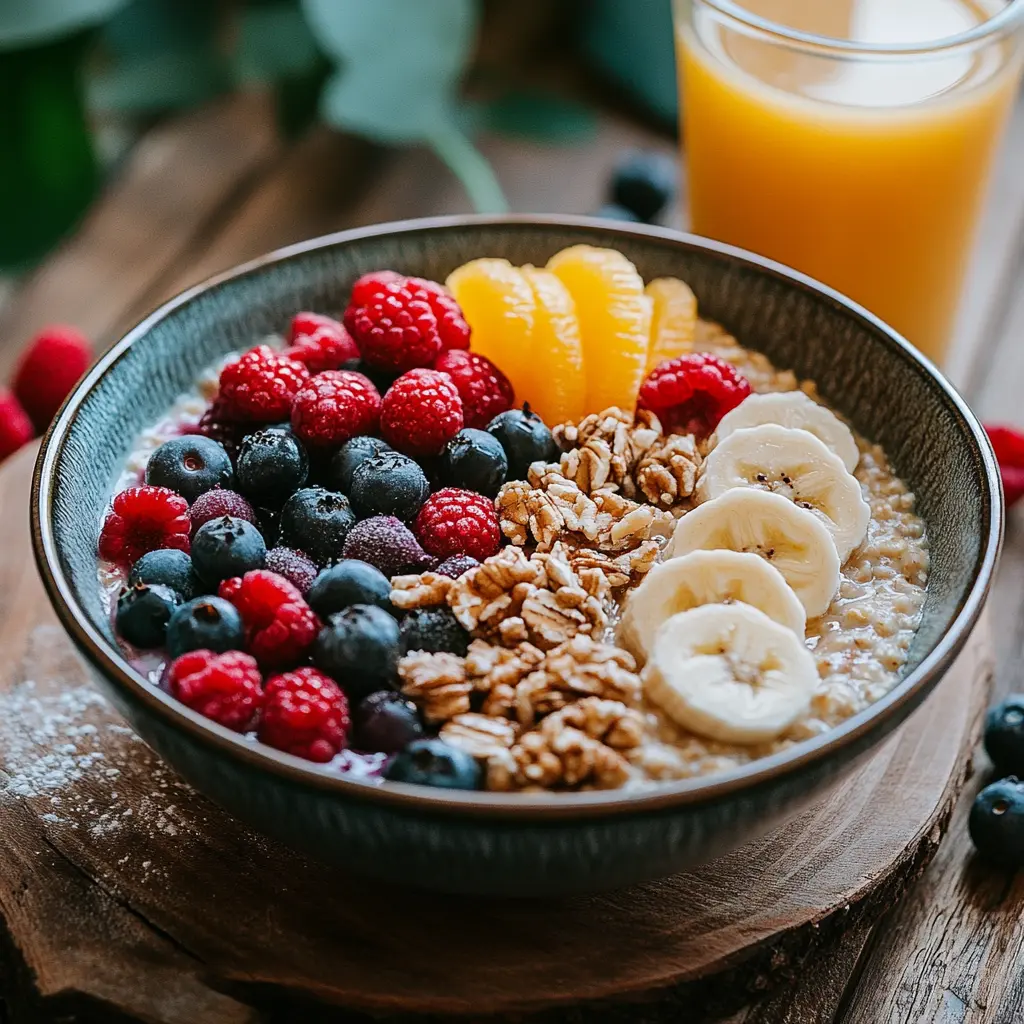Eating a healthy breakfast is more than a morning ritual; it’s a cornerstone of a vibrant lifestyle. Around the world, people embrace unique breakfast traditions that showcase the diversity of tastes, cultures, and nutritional priorities. But what makes a breakfast truly healthy, and is there one meal that earns the title of the “world’s No. 1 healthy breakfast”? This article dives deep into the components, benefits, and contenders for this coveted title, exploring everything from hearty oatmeal to colorful smoothie bowls. Let’s unravel the mystery and discover what breakfast reigns supreme.
Part 1: Introduction and Background
What Defines a Healthy Breakfast?
A healthy breakfast strikes a balance between taste and nutrition. It’s not just about filling your stomach; it’s about fueling your body and mind for the day ahead. A meal rich in essential nutrients, such as proteins, healthy fats, complex carbohydrates, vitamins, and minerals, can set the tone for a productive and energetic day.
Yet, it’s not one-size-fits-all. Breakfasts vary greatly, shaped by cultural preferences, dietary restrictions, and personal lifestyles. From a simple bowl of yogurt topped with fresh fruits to a complete platter of whole grains, veggies, and eggs, the variety is endless. And that’s the beauty of breakfast—it’s versatile, adaptable, and deeply personal.
Why Breakfast Matters
Breakfast has often been dubbed the “most important meal of the day,” and for good reason. When done right, it replenishes your energy reserves, stabilizes blood sugar, and helps you stay focused. Skipping it, on the other hand, can leave you sluggish, cranky, and ravenously hungry later in the day.
Here’s why breakfast should never be overlooked:
- Boosts Energy and Productivity: After fasting overnight, your body craves energy. A healthy breakfast restores glycogen levels, fueling your muscles and brain.
- Supports Weight Management: Regular breakfast eaters often have better control over their hunger throughout the day.
- Enhances Cognitive Function: Eating in the morning improves focus, memory, and problem-solving skills—crucial for those with busy schedules.
- Fosters Long-Term Health Benefits: Studies have linked eating a nutritious breakfast to a reduced risk of heart disease, diabetes, and obesity.
Breakfast Preferences Around the World
Breakfast traditions around the world are as diverse as the cultures they represent. While some countries lean towards light and simple meals, others favor heartier options packed with flavors and textures. For instance:
- In Japan, a traditional breakfast might include rice, fish, miso soup, and pickled vegetables.
- Mediterranean regions often focus on fruits, nuts, olive oil, and whole-grain bread.
- In the West, oats, eggs, and toast are common staples.
Each culture’s breakfast reflects its history, geography, and health philosophies. Yet, certain ingredients consistently appear across the globe, hinting at the universal components of a healthy start to the day.
Statement of Focus
This article explores the essential criteria for a nutrient-packed breakfast and evaluates popular breakfast choices from different corners of the globe. We’ll pinpoint why some meals, like oatmeal, are often hailed as the world’s healthiest option and provide actionable tips to help you elevate your breakfast game. Buckle up as we begin the search for the world’s No. 1 healthy breakfast!
Part 2: Criteria for a Healthy Breakfast
Nutritional Components of a Healthy Breakfast
A truly healthy breakfast goes beyond just satisfying your hunger; it fuels your body with a combination of essential nutrients to kickstart your day. The key components include:

1. Macronutrients: Balancing the Basics
A good breakfast incorporates carbohydrates, proteins, and healthy fats. Each macronutrient plays a vital role:
- Carbohydrates: Provide the quick energy needed to jumpstart your morning. Choose complex carbs like oats, whole-grain bread, and quinoa over refined options to maintain steady energy levels.
- Proteins: Essential for muscle repair and satiety, protein-rich foods like eggs, yogurt, tofu, or nuts can help keep mid-morning hunger at bay.
- Healthy Fats: Found in foods like avocado, nuts, seeds, and olive oil, these fats support brain function and promote heart health.
2. Micronutrients: Small But Mighty
Your breakfast should also supply essential vitamins and minerals. These can come from fruits, vegetables, or fortified foods. For example:
- Vitamin C: Found in citrus fruits, berries, and kiwis, it boosts your immune system.
- Calcium and Vitamin D: Dairy or plant-based alternatives like almond milk or fortified soy milk ensure strong bones and teeth.
- Iron and Zinc: These are crucial for energy and overall vitality, often found in leafy greens, eggs, and seeds.
3. Fiber and Antioxidants: The Unsung Heroes
Fiber-rich foods like whole grains, fruits, and legumes aid digestion, while antioxidants protect your cells from damage caused by free radicals. Adding a handful of berries or a sprinkle of chia seeds to your breakfast can make all the difference.
Health Benefits of a Nutrient-Rich Breakfast
When you prioritize a well-balanced breakfast, your body thanks you in numerous ways. Here are the standout benefits:
Regulating Blood Sugar Levels
A balanced breakfast, particularly one with low glycemic index foods, helps prevent blood sugar spikes and crashes. This stability is especially important for managing energy and mood throughout the day.
Supporting Muscle and Bone Health
Protein and calcium-rich breakfasts ensure your muscles and bones are well-nourished. This is particularly important for active individuals and those aiming to preserve bone density as they age.
Reducing the Risk of Chronic Diseases
Studies consistently link regular, nutrient-dense breakfasts to a lower risk of heart disease, type 2 diabetes, and obesity. Whole grains, fruits, and nuts are heart-healthy staples that make a big impact.
Cultural and Dietary Considerations
One person’s ideal breakfast might not work for another, and that’s okay. With diverse dietary habits and lifestyles worldwide, healthy breakfasts can take many forms.
Accommodating Special Diets
- Vegetarian or Vegan: Start with a base like avocado toast or a smoothie bowl, incorporating plant-based protein sources like nuts, seeds, or legumes.
- Low-Carb or Keto: Focus on eggs, cheese, and non-starchy vegetables.
- Gluten-Free: Choose naturally gluten-free grains such as quinoa, rice, or millet.
Cultural Adaptations for Breakfast
Cultural influences also shape how people approach the first meal of the day. A traditional Japanese breakfast might feature miso soup and fish, which are rich in nutrients and low in fat. Meanwhile, Mediterranean breakfasts often highlight whole grains, olive oil, and fresh produce, all hallmarks of heart-healthy eating.
How to Build a Balanced Breakfast
Creating a balanced breakfast doesn’t have to be a chore. Use these principles to guide your choices:
Start with a Whole Grain Base
Whole grains like oats, quinoa, or whole-grain bread are excellent sources of energy and fiber. They keep you feeling fuller for longer and prevent energy dips.
Add Protein for Staying Power
Proteins like Greek yogurt, boiled eggs, or a handful of nuts can make your breakfast more filling. For plant-based eaters, options like tofu scramble or peanut butter are equally satisfying.
Include a Rainbow of Fruits and Veggies
Colorful produce is packed with antioxidants, fiber, and vitamins. Consider adding fresh berries to oatmeal, slicing avocado onto toast, or blending spinach into a smoothie.
Don’t Forget Healthy Fats
A sprinkle of chia seeds, a drizzle of olive oil, or half an avocado can elevate your meal’s nutritional profile.
Common Pitfalls to Avoid
Even with the best intentions, many breakfasts fall short of being truly healthy. Watch out for:
- Overloaded Sugar: Many breakfast cereals and flavored yogurts contain hidden sugars. Opt for unsweetened or naturally sweetened alternatives instead.
- Skipping Protein: A carb-heavy meal without protein can leave you hungry before lunch.
- Relying on Processed Foods: Pre-packaged breakfasts may save time, but they’re often laden with preservatives and lack essential nutrients.
Why It’s Worth the Effort
It’s tempting to grab something quick and convenient during a hectic morning, but investing time in a balanced breakfast pays off in spades. Whether you’re aiming to improve focus, manage your weight, or simply feel better, a nutrient-rich morning meal can set the tone for your entire day. As the saying goes, “breakfast is the most important meal of the day”—and for good reason!
Let’s move on to explore some of the most popular contenders for the title of the world’s No. 1 healthy breakfast.
Part 3: Top Candidates for the World’s No. 1 Healthy Breakfast
Oats and Porridge: The Global Favorite
When it comes to wholesome breakfasts, oats often steal the spotlight—and for good reason. A bowl of oatmeal is a powerhouse of fiber, protein, and essential vitamins, making it a go-to choice for health enthusiasts worldwide.

- Nutritional Profile of Oats
Oats are rich in beta-glucan, a type of soluble fiber that promotes heart health by reducing LDL cholesterol. They’re also an excellent source of manganese, iron, and B vitamins. Rolled, steel-cut, or instant, oats retain their nutritional punch while offering versatility in preparation. - Benefits for Heart and Gut Health
Oats are celebrated for their ability to regulate blood sugar levels and support digestion. Thanks to their high fiber content, they improve gut microbiota, keeping your digestive system running smoothly. - Versatility in Toppings and Preparations
From sweet to savory, oats adapt to every palate. Popular toppings include fresh fruits, nuts, seeds, and a drizzle of honey. For a savory twist, you can try oatmeal with sautéed spinach, a poached egg, and a sprinkle of chili flakes.
Smoothie Bowls: A Colorful Contender
Smoothie bowls have gained popularity as a visually appealing, nutrient-dense breakfast option. These vibrant meals are as nutritious as they are Instagram-worthy, often packed with superfoods, antioxidants, and fiber.
- Superfoods and Nutrient Density
Common smoothie bowl bases include frozen bananas, berries, and spinach, blended into a creamy texture. Ingredients like chia seeds, flaxseeds, and spirulina are frequently added for a nutrient boost. - Customizable Recipes for Maximum Benefits
One of the best aspects of smoothie bowls is their adaptability. You can tailor the ingredients to meet specific health goals, whether it’s adding protein powder for muscle repair or incorporating avocado for healthy fats. - Popularity Among Health-Conscious Communities
Smoothie bowls have become a staple for those who follow plant-based diets or seek a light yet satisfying breakfast. They’re an easy way to pack a variety of nutrients into one meal, all while being visually appealing.
Egg-Based Dishes: A Protein Powerhouse
Eggs are a breakfast classic—and they’re not going anywhere. Packed with high-quality protein, healthy fats, and essential nutrients, eggs offer both versatility and satiety.
- Nutritional Value of Eggs
Eggs provide essential nutrients like choline (vital for brain health), selenium, and vitamin D. Despite concerns about cholesterol, research shows they’re a heart-healthy option when consumed in moderation. - Different Styles Across Cultures
Eggs transcend cultural boundaries, appearing in countless breakfast dishes:- Western Favorites: Scrambled eggs, omelets, or poached eggs on toast.
- Asian Variants: Egg rice bowls or spiced egg curries.
- Middle Eastern Recipes: Shakshuka, a flavorful dish of poached eggs in a spicy tomato sauce.
- Supporting Satiety and Muscle Growth
Thanks to their high protein content, eggs are particularly beneficial for those looking to maintain or build muscle. They’re also incredibly filling, making them an excellent choice for weight management.
Avocado Toast: A Modern Classic
Avocado toast has emerged as a contemporary favorite, celebrated for its richness in healthy fats, fiber, and versatility. Whether paired with eggs, smoked salmon, or a sprinkle of chili flakes, it’s a breakfast that satisfies both the taste buds and the body.
- Rich in Healthy Fats and Fiber
Avocado is a fantastic source of monounsaturated fats, which are known to improve heart health. Combined with whole-grain bread, it offers a balanced meal packed with fiber and nutrients. - Easy Pairing with Other Nutrient-Dense Foods
Adding a boiled egg, cherry tomatoes, or a dollop of hummus enhances both flavor and nutritional value, making this dish a well-rounded breakfast option.
Part 4: Why Oatmeal is Often Ranked as No. 1
Why Experts Recommend Oatmeal
Oatmeal frequently tops the charts as the healthiest breakfast worldwide, and it’s not hard to see why. Packed with fiber, essential nutrients, and antioxidants, oatmeal checks all the boxes for a balanced and satisfying meal.
- High Fiber Content for Digestive Health
The beta-glucan in oats is a standout nutrient, known for supporting gut health and maintaining regular digestion. This soluble fiber forms a gel-like substance in the stomach, slowing digestion and promoting a feeling of fullness. - Low Glycemic Index for Stable Energy
Unlike sugary breakfast options, oatmeal has a low glycemic index, meaning it releases energy gradually. This steadiness helps avoid the mid-morning crash, keeping you energized and focused. - Packed with Vitamins, Minerals, and Antioxidants
Oats are rich in manganese, phosphorus, magnesium, and zinc, all vital for overall well-being. Additionally, they contain antioxidants called avenanthramides, which have anti-inflammatory properties and support cardiovascular health.
Scientific Studies Supporting Oatmeal’s Benefits
The nutritional benefits of oatmeal are not just anecdotal; they are backed by extensive scientific research:
- Heart Health
A Harvard University study found that regular consumption of whole grains like oats reduces the risk of coronary heart disease by as much as 20%. Beta-glucan, specifically, has been linked to lowering bad cholesterol levels. - Weight Management
A study published in the Journal of the American College of Nutrition showed that oatmeal keeps you feeling fuller for longer, thanks to its fiber content. This satiety can help in controlling calorie intake throughout the day. - Improved Metabolism
The slow-digesting carbohydrates in oats provide sustained energy, aiding in better blood sugar control. This is particularly beneficial for those with type 2 diabetes or those looking to improve metabolic health.
Popular Recipes to Try
The versatility of oatmeal makes it a favorite across cultures and cuisines. Here are some ideas to transform your morning oats into a delicious and nutritious experience:
- Overnight Oats with Fruits and Nuts
Combine rolled oats, milk or a plant-based alternative, and a natural sweetener like honey. Refrigerate overnight, then top with fresh berries, banana slices, and a handful of walnuts in the morning. - Savory Oatmeal Bowls
Switch things up with a savory twist! Cook oats with vegetable broth, then top with sautéed spinach, a poached egg, and a sprinkle of nutritional yeast for a cheesy flavor. - Baked Oatmeal with Apples and Cinnamon
Mix oats with almond milk, chopped apples, cinnamon, and a touch of maple syrup. Bake until golden for a warm, comforting breakfast that feels like dessert.
FAQs
What are the healthiest breakfasts in the world?
Healthy breakfasts vary by culture, but some universal options include oatmeal, smoothie bowls, and eggs with whole-grain toast. Other contenders include Japanese breakfasts (featuring rice, fish, and miso soup), Mediterranean options (fruits, nuts, and yogurt), and Indian classics like idli or dosa paired with vegetables.
What makes oatmeal the top healthy breakfast?
Oatmeal stands out due to its high fiber content, low glycemic index, and impressive nutrient profile. It promotes digestive health, provides sustained energy, and is rich in antioxidants. Its versatility also means it can be tailored to suit individual preferences and dietary needs.
Are smoothie bowls really healthy?
Yes, smoothie bowls can be a nutrient-dense choice if made with wholesome ingredients. Using fresh or frozen fruits, leafy greens, nuts, and seeds ensures you’re getting vitamins, minerals, and fiber. However, it’s important to watch out for excessive sweeteners or toppings that may add unnecessary sugar.
What are good protein-rich breakfast ideas?
Protein-rich breakfasts include scrambled eggs, Greek yogurt with granola, or tofu scramble with vegetables. Adding nuts, seeds, or a protein shake to your morning routine can also help boost your intake and keep you feeling full longer.
How can I make my breakfast healthier?
Simple swaps can make a big difference. Choose whole-grain bread over white, replace sugary cereals with oats or granola, and include fruits and vegetables for added fiber and vitamins. Cooking at home and avoiding processed options also ensures better control over your meal’s nutritional quality.
Is skipping breakfast bad for your health?
Skipping breakfast can affect energy levels, concentration, and hunger regulation. While some people find intermittent fasting beneficial, most experts agree that eating a nutritious breakfast is better for long-term health, particularly for maintaining stable blood sugar and preventing overeating later in the day.
Conclusion
From oats to smoothie bowls and eggs, the world’s healthiest breakfasts come in many forms, each offering a unique combination of nutrients and flavors. Among these, oatmeal often takes the crown, thanks to its rich nutrient profile, heart-health benefits, and versatility. By focusing on balanced ingredients and mindful preparation, you can transform any breakfast into a nutritious start to your day.
Why not experiment with these options and discover your personal favorite? After all, the best breakfast is one that nourishes your body and delights your taste buds.

